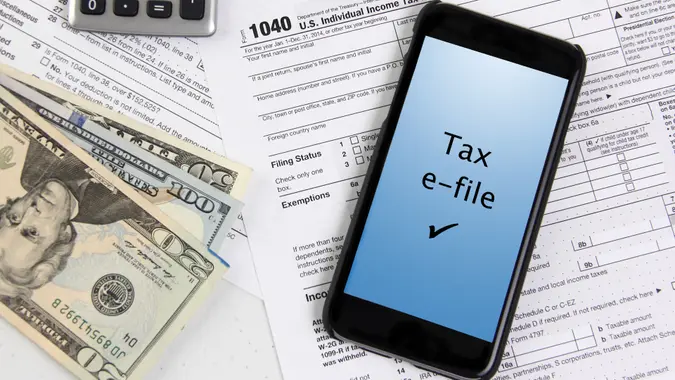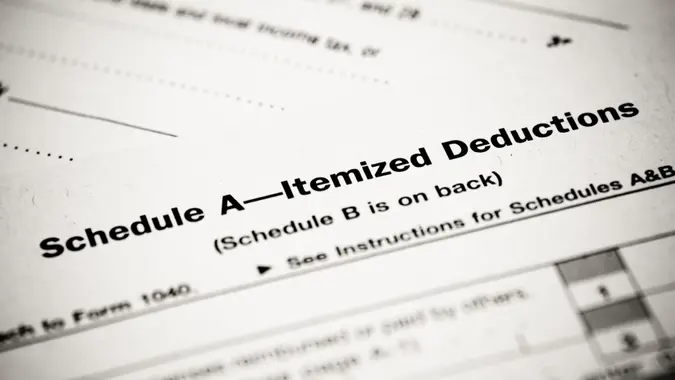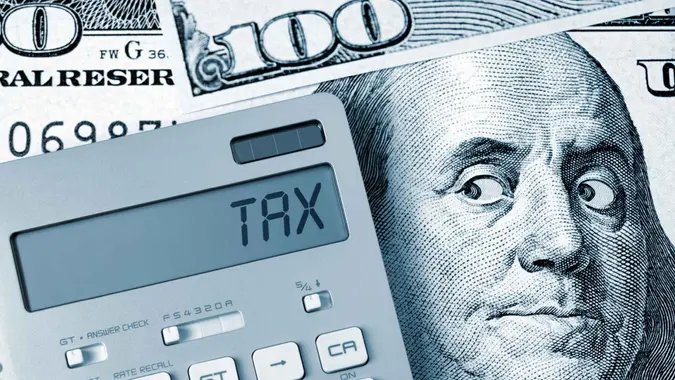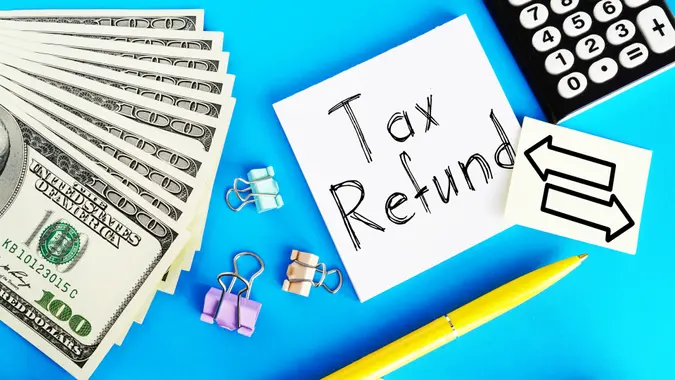How California State Income Tax Works: Brackets, Deductions and Credits Explained

Commitment to Our Readers
GOBankingRates' editorial team is committed to bringing you unbiased reviews and information. We use data-driven methodologies to evaluate financial products and services - our reviews and ratings are not influenced by advertisers. You can read more about our editorial guidelines and our products and services review methodology.

20 Years
Helping You Live Richer

Reviewed
by Experts

Trusted by
Millions of Readers
California’s state income tax is progressive, meaning higher earners pay higher tax rates, and it can take a meaningful bite out of your paycheck depending on your income and filing status. The state uses multiple tax brackets, allows certain deductions and credits to reduce what you owe, and applies some of the highest marginal rates in the country to top earners.
Understanding how California’s tax brackets, deductions, and credits work can help you estimate your tax bill more accurately — and spot opportunities to lower it — whether you’re a W-2 employee, self-employed, or filing jointly with a spouse.
How California’s Income Tax Brackets Really Work
California has the highest top marginal state income tax rate in the country at 13.3%, according to data from the Tax Foundation. But that headline number doesn’t apply to most taxpayers. California uses a progressive (graduated) income tax system, which means your tax rate increases as your income rises and only the portion of your income that falls into each bracket is taxed at that higher rate.
In practice, California’s tax brackets divide your taxable income into layers, with each layer taxed at a different percentage. As your income crosses a bracket threshold, only the dollars above that threshold are taxed at the higher rate — not your entire income.
Understanding how these brackets work is important for both individuals and households. It helps you estimate your true take-home pay, plan for withholding throughout the year, and avoid an unexpected tax bill when you file. Whether you’re a W-2 employee, self-employed, or managing multiple income sources, knowing where your income falls in California’s tax structure can make a real difference in how much you owe.
California Income Tax Brackets
California’s state income tax rates range from 1% to 12.3% for most taxpayers, depending on your income level and filing status. A 13.3% rate applies to very high earners due to an additional mental health services tax. The system is progressive, meaning your income is taxed in layers, with higher rates applying only to income above each bracket threshold.
To see how this plays out, consider a single filer earning $80,000. That income doesn’t get taxed at one flat rate. Instead, it’s broken into portions, with each portion taxed at its own rate:
- The first ~$10,000 is taxed at 1%
- The next ~$14,000 is taxed at 2%
- The next ~$14,000 is taxed at 4%
- The remaining income is taxed progressively at higher rates, topping out at 9.3% for this income level
This layered approach means your effective tax rate — the average rate you actually pay — is lower than your highest marginal rate.
Calculating Your California State Income Tax
California organizes its tax brackets into three schedules:
- Schedule X applies to single filers and married taxpayers filing separately
- Schedule Y applies to married taxpayers filing jointly and qualifying surviving spouses
- Schedule Z applies to head of household filers
Each schedule uses different income ranges, which can significantly affect how much tax you owe — even at the same income level.
To calculate what you owe:
- Start with your federal AGI from IRS Form 1040
- Make California-specific adjustments using Schedule CA (540)
- Choose your deduction, which is either standard or itemized
- Apply the correct tax table based on your income and status
- Subtract eligible credits
Want a simple breakdown? Use an online California tax calculator for a quick estimate.
Below are the current California income tax brackets as published by the Franchise Tax Board, which administers the state’s personal income tax system.
Single Filers and Married Filing Separately
| Taxable Income Bracket | Tax Rate | Tax Owed |
|---|---|---|
| $0 to $11,079 | 1% | 1% of taxable income |
| $11,079 to $26,264 | 2% | $110.79, plus 2% of income over $11,079 |
| $26,264 to $41,452 | 4% | $414.49, plus 4% of income over $26,264 |
| $41,452 to $57,542 | 6% | $1,022.01, plus 6% of income over $41,452 |
| $57,542 to $72,724 | 8% | $1,987.41, plus 8% of income over $57,542 |
| $72,724 to $371,479 | 9.3% | $3,201.97, plus 9.3% of income over $72,724 |
| $371,479 to $445,771 | 10.3% | $30,986.19, plus 10.30% of income over $371,479 |
| $445,771 to $742,953 | 11.3% | $38,683.27, plus 11.3% of income over $445,771 |
| Over $742,953 | 12.3% | $72,219.84 plus 12.3% of income over $742,953 |
Married Filing Jointly
| Taxable Income Bracket | Tax Rate | Tax Owed |
|---|---|---|
| $0 to $22,158 | 1% | 1% of taxable income |
| $22,158 to $52,258 | 2% | $221.58, plus 2% of income over $22,158 |
| $52,528 to $82,904 | 4% | $828.98 plus 4% of income over $52,528 |
| $82,904 to $115,084 | 6% | $2,044.02, plus 6% of income over $82,904 |
| $115,084 to $145,448 | 8% | $3,974.82, plus 8% of income over $115,084 |
| $145,448 to $742,958 | 9.3% | $6,403.94, plus 9.3% of income over $145,448 |
| $742, 958 to $891,542 | 10.3% | $61,972.37, plus 10.3% of income over $742,958 |
| $891,542 to $1,485, 906 | 11.3% | $77,276.52 plus 11.3% over $891,542 |
| $1,485, 906 or more | 12.3% | $144,439.65, plus 12.3% of of income over $1,485,906 |
Head of Household
| Taxable Income Bracket | Tax Rate | Tax Owed |
|---|---|---|
| $0 to $22,173 | 1% | 1% of taxable income |
| $22,173 to $52,530 | 2% | $221.73, plus 2% of income over $22,173 |
| $52,530 to $67,716 | 4% | $828.87, plus 4% of income over $52,530 |
| $67,716 to $83,805 | 6% | $1,436.31, plus 6% of income over $67,716 |
| $83,805 to $98,990 | 8% | $2,401.65, plus 8% of income over $83,805 |
| $98,990 to $505,208 | 9.3% | $3,616.45, plus 9.3% of income over $98,990 |
| $505,208 to $606,251 | 10.3% | $41,394.72, plus 10.3% of income over $505,208 |
| $606,251 to $1,010, 417 | 11.3% | $51,802.15, plus 11.3% of income over $606,251 |
| Over $1,101, 417 | 12.3% | $94 472.91, plus 12.3% of income over $1,0101, 417 |
Note: Income over $1 million is subject to an additional 1% Mental Health Services Tax.
How California Taxes Income of $100,000 or Less
For taxable income of $100,000 or less, California uses a Tax Table rather than traditional bracket calculations. The table assigns a fixed tax amount to narrow income ranges, reflecting the state’s graduated tax system without requiring manual rate calculations.
For single filers or married taxpayers filing separately, the highest tax shown in the table is $5,951, which applies to taxable income between $99,951 and $100,000, according to the Franchise Tax Board.
What Is Taxable Income in California?
California starts with your federal adjusted gross income (AGI) and then applies its own set of additions and subtractions to determine your California taxable income. This includes income from wages and salaries, interest and dividends, rental income, and capital gains–but it doesn’t always follow federal rules exactly.Common California-specific adjustments can include:
- Student loan interest
- Mortgage interest (California limits differ from federal rules)
- State tax refunds, which may be taxable in some cases
- Health savings account (HSA) contributions
- Gambling losses, which are subject to limits
Some items, such as FICA taxes withheld from your paycheck, are not part of taxable income, and certain income types may receive different treatment under California law.
For a full list, refer to Schedule CA (540) on the Franchise Tax Board’s forms page, which details how California modifies federal AGI.
Common Adjustments Made to a California Tax Return
California’s tax rules differ from federal rules in several key ways, which can affect what you’re allowed to deduct or must add back when filing your state return. Common California-specific adjustments include:
- Mortgage interest: California allows a mortgage interest deduction, but it follows its own limits and rules, which differ from federal guidelines.
- State and local taxes (SALT): California does not allow a deduction for state or local taxes paid on your state return.
- Gambling losses: Gambling losses are not deductible on a California tax return, even if they’re deductible federally.
- Charitable contributions: Donations must be made to a qualified organization and properly documented to be deductible.
Who Is Required To File a California Income Tax Return?
You may need to file a California state income tax return even if you don’t live in the state full time. California’s filing requirements apply to residents, part-year residents, and some nonresidents, depending on your income, where it was earned, and whether you’re claiming certain credits or owe special taxes.
The chart below outlines the most common reasons you’re required to file a California return.
| Reason You Must File | What It Means |
|---|---|
| Income meets or exceeds filing thresholds | Your gross income or California adjusted gross income (CA AGI) is above the required amount for your filing status and number of dependents |
| You owe special taxes or penalties | You owe California alternative minimum tax (AMT), health savings account (HSA) penalties, or other special taxes |
| You earned California-source income | You’re a nonresident or part-year resident who earned income from a California source |
| You’re claiming refundable credits | You want to claim certain California tax credits that require filing a return |
| You’re a dependent with sufficient income | Your income exceeds the filing threshold for dependents |
Filing rules and income thresholds are set by the Franchise Tax Board and can change from year to year, so it’s important to check the current requirements before assuming you don’t need to file.
California Residency Requirements for Tax Purposes
California generally considers you a resident for tax purposes if the state is your primary place of residence or you maintain strong ties there. Common factors the state looks at include:
- You spend most of the year in California
- Your spouse or dependents live in California
- You hold a California driver’s license, are registered to vote in the state, or maintain other significant connections
Residency isn’t determined by a single factor. The Franchise Tax Board reviews the full picture of where you live, work, and maintain personal and financial ties when making a determination.
California Gross Income and AGI Filing Thresholds
California’s filing requirements are based on California adjusted gross income (CA AGI), not your gross pay. CA AGI starts with your federal adjusted gross income and then applies California-specific additions and subtractions. If your CA AGI meets or exceeds certain thresholds, you’re required to file a California income tax return.
The income limits vary based on filing status, age, and number of dependents. Use the tables below to find the threshold that matches your situation. If your CA AGI is at or above the listed amount, you generally must file a return.
All thresholds are published annually by the Franchise Tax Board.
Single or Head of Household
| Age | 0 Dependents | 1 Dependent | 2+ Dependents |
|---|---|---|---|
| Under 65 | $18,353 | $34,186 | $46,061 |
| 65 or older | $26,003 | $37,878 | $47,738 |
Married Filing Jointly or Separately
| Age | 0 Dependents | 1 Dependent | 2+ Dependents |
|---|---|---|---|
| Under 65 | $36,711 | $52,544 | $64,419 |
| One spouse/RDP 65+ | $44,361 | $56,236 | $65,736 |
| Both spouses/RDPs 65+ | $52,011 | $63,886 | $73,386 |
Qualifying Surviving Spouse or RDP
| Age | 0 Dependents | 1 Dependent | 2+ Dependents |
|---|---|---|---|
| Under 65 | N/A | $34,186 | $46,061 |
| 65 or older | N/A | $37,878 | $47,378 |
California Tax Deductions and Credits
California offers two main ways to lower your state tax bill: deductions, which reduce the income you’re taxed on, and credits, which directly reduce the tax you owe. Understanding the difference can help you estimate your true tax savings.
Deductions on a California Tax Return
Tax deductions lower your taxable income. For example, if you earn $100,000 and claim $10,000 in deductions, you’re taxed on $90,000.
You can choose between the standard deduction or itemized deductions. Itemizing only makes sense if your total deductible expenses exceed the standard deduction.
Common California itemized deductions may include:
- Home mortgage interest (on qualifying loans, subject to California limits)
- Medical expenses that exceed 7.5% of your AGI
- Gambling losses (to the extent of winnings)
- Certain job-related expenses allowed under California rules
- Alimony paid, if eligible
Credits on a California Tax Return
Tax credits reduce your tax bill dollar for dollar. If you owe $10,000 in state tax and qualify for a $1,000 credit, your final tax bill drops to $9,000.
California offers a wide range of credits, including:
- California Earned Income Tax Credit (CalEITC): Helps low- and moderate-income workers
- Young Child Tax Credit: Additional credit for CalEITC recipients with a child under age six
- Child and Dependent Care Expenses Credit: Helps offset childcare costs while you work or look for work
- Child Adoption Costs Credit: Covers qualified adoption expenses
- Dependent Parent Credit: For taxpayers who financially support a qualifying parent
- Foster Youth Tax Credit: Available to eligible former foster youth ages 18-25
- Joint Custody Head of Household Credit: For parents who share custody but don’t qualify as head of household
- Nonrefundable Renter’s Credit: For low- to moderate-income renters who meet income and residency rules
- Senior Head of Household Credit: For qualifying taxpayers age 65 and older
- Prior Year Alternative Minimum Tax Credit: Allows recovery of AMT paid in earlier years
- College Access Tax Credit: For contributions to the California College Access Tax Credit Fund
How To Calculate Your California State Income Tax
Calculating your California state income tax is a process, but it’s manageable when you take it one step at a time. Here’s how it generally works:
- Choose the correct form. Most taxpayers file Form 540, 540NR (for part-year or nonresidents), or 540EZ, depending on residency and income.
- Start with your federal return. Your IRS Form 1040 provides the foundation for your California return and helps ensure consistency between federal and state filings.
- Apply California-specific adjustments. Use Schedule CA (540) to add or subtract income based on California’s tax rules.
- Select your deductions. Choose either the standard deduction or itemized deductions, whichever lowers your taxable income more.
- Calculate your tax. Use the appropriate California tax table or tax rate schedule based on your income and filing status.
- Apply eligible credits. Subtract any California tax credits you qualify for to reduce your final tax bill.
- Review and file your return. Double-check your numbers, then submit your return.
You can file through CalFile, approved tax software, or a tax professional. Paper filing is also available, though it typically takes longer to process.
California Filing Deadlines and Penalties
Meeting California’s tax deadlines is important, especially if you owe money. Filing late — or paying late — can trigger penalties and interest, even if you eventually submit a return. The chart below outlines the key dates most taxpayers need to know.
| Filing Requirement | Deadline |
|---|---|
| Personal income tax return | April 15 |
| Extension filing deadline | October 15 |
| Estimated tax payments | April 15, June 15, September 15, January 15 |
California provides an automatic six-month extension to file, which moves the filing deadline to October 15. However, this extension applies only to filing — not to paying. Any tax you owe is still due by April 15, even if you file later.
If you don’t owe tax, the extension gives you more time to file without penalty. If you’re expecting a refund, keep in mind that it won’t be issued until you actually file your return.
Penalties and interest are assessed on unpaid balances after the April deadline, which is why paying on time — even if you file later — can help you avoid extra costs.
Final Takeaway: Making Sense of California State Income Tax
California’s income tax system can feel complex at first, but it’s much easier to navigate once you understand how tax brackets, adjustments, deductions, and credits fit together. Knowing where you fall — whether you’re a full-year resident, part-year filer, or nonresident earning California income — can help you file accurately, plan ahead, and avoid penalties.
If you want to stay ahead of surprises, use reputable tax software, work with a CPA, or consult resources from the Franchise Tax Board to make sure you’re using the most current rules and thresholds.
FAQ
Understanding how California income tax works will help you avoid unpleasant surprises come tax day.- Is California a high income tax state?
- Yes. California residents pay a marginal tax rate of 13.3%, which is the highest state tax rate in the country.
- Who needs to file California state income taxes?
- You need to file a state income tax return in California if the following conditions apply to you:
- You're required to file a federal income tax return
- You receive income from a California source
- Your income exceeds the thresholds for California gross income and California adjusted gross income
- You need to file a state income tax return in California if the following conditions apply to you:
- How to claim deductions on California state taxes?
- You can choose either the standard deduction or itemized deductions on your California state taxes. You should only claim itemized deductions if their total is more than the standard deduction amount.
Editorial Note: This content is not provided by any entity covered in this article. Any opinions, analyses, reviews, ratings or recommendations expressed in this article are those of the author alone and have not been reviewed, approved or otherwise endorsed by any entity named in this article.
Our in-house research team and on-site financial experts work together to create content that’s accurate, impartial, and up to date. We fact-check every single statistic, quote and fact using trusted primary resources to make sure the information we provide is correct. You can learn more about GOBankingRates’ processes and standards in our editorial policy.
- State of California Franchise Tax Board "CalFile"
- Tax Foundation "State Individual Income Tax Rates and Brackets, 2025"
- State of California Franchise Tax Board "California Adjustments – Residents"
- State of California Franchise Tax Board "Residents"
- State of California Franchise Tax Board "Tax Calculator"
- State of California Franchise Tax Board "Deductions"
- State of California Franchise Tax Board "Personal Filing Information"
 Written by
Written by  Edited by
Edited by 























